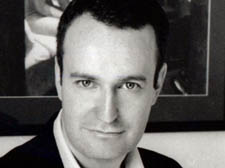|
|
 |
| |

Andrew O’Hagan: ‘never entirely at home’ |
Searing insight and empathy from essayist Andrew O'Hagan Gerald Isaaman meets a writer whose latest book is inspired by people in trouble
The Atlantic Ocean: Essays on Britain and America.
By Andrew O’Hagan. Faber £20 order this book
AS the economy tightens and everyone feels the pinch, it is worth looking back to see what happened in earlier trouble times. In the Tory days of 1993, for instance, there were beggars galore on the streets of London.
Andrew O’Hagan knows all about that. He went undercover to join them and, like George Orwell before him, found that there was no glittering prize on Wigan pier when you’re down and out and surviving on a menu of abuse and handouts and the largesse of Camden shelters.
He writes with empathy, panache and a touch of sardonic humour about the very different world we lived in then as he met up with the sad and the sick as they grubbed for pennies and an occasional pound at King’s Cross and the banks of the Thames, grateful to end the day with £2.86 in his hand.
“In the last 10 years, street begging in Britain has become visible in ways unseen since the early 19th century,” O’Hagan writes. “This has coincided, of course, with the Thatcher years, in which the idea of society as a non-thing, as a fruitless misnomer, has come into its own.”
And begging, which once produced more sympathy than disgust, had become professional in our major cities, resulting in headlines in the Daily Express declaring “Scandal of the Bogus Beggars”, some scruffy degenerates allegedly netting £1,000 a week.
Yet they failed to report the dead bodies tugged out of the Thames, the mental illness and alcoholism of those dossing in doorways and the fact that one police trawl at Charing Cross revealed that the largest number of beggars arrested (205) had between £1 and £5 on them.
O’Hagan’s collection of two dozen stylish essays, gathered together from his journalistic days on either side of the Atlantic – one short one on Marilyn Monroe is a memorable delight – are brought up to date with his remarkable excursion into the dangers of garbage collecting in England, written in May last year. The anthology opens with a compelling piece tracing the “special relationship” since the days of Margaret Thatcher and Ronald Reagan and comes to a tragic close with the twin death of two soldiers, a Coldstream guardsman and a Marine Corps officer, in Iraq.
His wanderings across the waves in some ways epitomises his feeling of being “homesick all my life”: “I felt homesick growing up and I feel the same way now, not unhappy, not aggrieved, but never entirely at home either,” he insists. But that undoubtedly provides an edge to his writing, which resulted in him being nominated five years ago as one of the 20 Best of Young British Novelists.
That’s the reality of how life has changed for O’Hagan, especially in the searing social detail and stress he captures so well as he pushes against the boundaries of urban life for a Glasgow-born lad who grew up in Kilwinning, Ayrshire.
He is inspired by people in trouble and says he knew he was going to be a writer when, at primary school, his teacher handed him the chalk when she left the class for a cigarette and ordered him to write down fellow pupils’ crimes on the blackboard while she was away.
His first book, Missing, is a graphic account of his own early days and of children who disappeared – including from his own family – which won three literary prizes. Our Fathers, his dazzling first novel, was shortlisted for the Booker and Whitbread awards in 1999.
His powerful last novel, Be Near Me, about a Catholic priest accused of child abuse, is being transformed into a play by the National Theatre of Scotland and will be seen at the West End’s Donmar Theatre early next year. And he has shifted his own personal boundary, from Islington to Hampstead.
“I’m not involved in writing the script,” he says about the play. “I’m involved in hanging around with the actors, drinking glasses of wine. It’s a new experience. I really love being exposed to a whole new world and learning new things.”
But as O’Hagan – described once as something of a drama queen – has said himself, acting is so close to writing.
•
|
 |
|
 |
 |
|
 |
|



